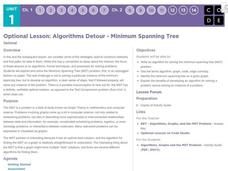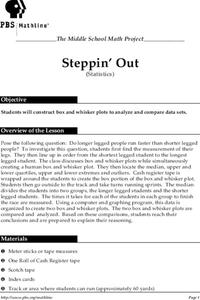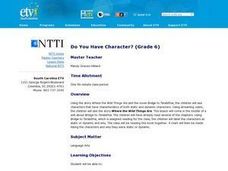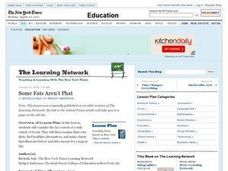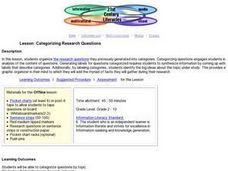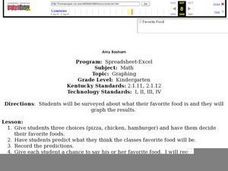Curated OER
Basic Computer Terms & Resources
Ninth graders examine and discuss the proper care of computers and the basic hardware components of computers.
Code.org
Algorithms Detour - Minimum Spanning Tree
This optional activity introduces the class to the idea of a minimum spanning tree. The activity focuses on determining an algorithm that will find the most efficient path in a network to transfer data.
Curated OER
Steppin' Out
Students are presented with the question: "Do longer legged people run faster than shorter legged people?" Students conduct an experiment, collect their data, create box and whisker plots using a computer and graphing program, and...
Curated OER
Dashboard of the Future
Students design dashboards for vehicles in 2020. After researching past and current trends in vehicle design, they sketch alternatives and select one to draw with computer-assisted design software (CAD), labeling all the components. With...
Curated OER
P.C. Games
Discuss and share opinions on violent computer games. After reading an article, your class will discover the controversy surrounding online games. They analyze the suitability of computer games and write their own letters to a developer...
Curated OER
Nutrition Matters
Investigate nutrition and the food pyramid. Fifth graders will use computer software to write a paragraph about nutrition. They will then diagram the food pyramid and gather and organize a collection of healthy recipes.
PBS
What Is Newsworthy?
What is news? What is newsworthy? Who decides and what criteria do they use? Introduce young journalists to the basics of reporting with this media literacy lesson.
Curated OER
Bizarre Food
Young scholars research foods from other countries. In this multicultural food lesson, students view a list of foods that kings and queens ate on an overhead transparency and go to the website www.jamessolheim.com/teachers1.htm to read...
Curated OER
Angles All Around Us
Explore with your class the characteristics of acute, obtuse, right, complementary, and supplementary angles. They take digital photographs around the school and identify the angles in the images. Uisng software, they label and print the...
Curated OER
Parts of a Plant
First graders discover the parts of a plant. For this science lesson, 1st graders identify and label the parts of a plant and record their findings on a word processor.
Curated OER
Do You Have Character?
Sixth graders read Katherine Paterson's novel, Bridge to Terabithia, and watch a video of Maurice Sendak's book, Where the Wild Things Are. They examine the characters in both stories that share similar characteristics. Students use the...
Curated OER
"The Drum"
Second graders read and discuss the folktale "The Drum" from India. They also answer story comprehension questions, complete an adjectives and verb worksheet, and label a map of India. Students sequence events from the story and make...
Curated OER
Some Fats Aren't Phat
Students examine nutritional information on various food labels and then consider the nutritional value of the foods in their own diets. They create posters illustrating their diets "before" and "after" they considered their fat intake.
Curated OER
Measuring & Graphing Motion
Fifth graders study how to measure distance. In this graphing motion lesson students complete a lab activity that shows them on the computer how to make graphs.
Curated OER
This is the Way We Go To School
Second graders create and utilize a graph using the Excel computer program. They gather data regarding how the students get to school, tally the numbers for the class, and create a bar graph on paper and using Excel.
Curated OER
Mathematics & Nutrition
Students apply math to calculate fat and calories in the food they eat. They examine food package information to become aware of the ingredients and to learn about healthy life styles. They work in groups to create crazy meals using the...
Curated OER
Cell Organelles and Their Functions
Students will be using Inspiration, which is a graphic organizer computer program, to create their own model community where they will label the community parts with the corresponding organelle. They will have prior knowledge of cell...
Curated OER
When Something's Missing: Diagnosing Vitamin Deficiencies
The New York Times "Education" section posts an extensive lesson on vitamin and mineral deficiencies. It involves class discussion, examination of food packaging labels, and the reading of a blog post about Vitamin D. The highlight of...
Curated OER
Categorizing Research Questions
Show learners of all ages the necessary steps to solid research. Before even looking at a computer screen, they need to generate research questions or topics. They then work together to categorize all of the proposed topics. This process...
Curated OER
Blast the Fats
Students examine the fats found in foods. In this nutrition lesson, students identify the types and amounts of fats found in foods as they research food labels and the Internet. Students classify the fats and record their data.
SoundTree
Teaching Jazz Structure with 2-track Stereo Digital Audio Software
Melody, solo, melody. After a discussion of the structure of a jazz tune and of improvisation as it relates to jazz, young musicians listen to a jazz CD and then, using 2-track stereo digital audio software, place and label markers in an...
Curated OER
Favorite Food
Students are given three choices of food. They then decide on their favorite and predict what the class's favorite food will be. After the teacher enters the data into the computer, students gather around the computer to view the...
Curated OER
Number Sense and Numeration
Students add and subtract integers. In this algebra instructional activity, students discuss number sense as they sort numbers in the correct order. They analyze and label numbers differentiating between rational and irrational numbers.
Curated OER
Picture It-Fractions
Third graders draw pictures of fractions and label them with the correct fractional amount.



